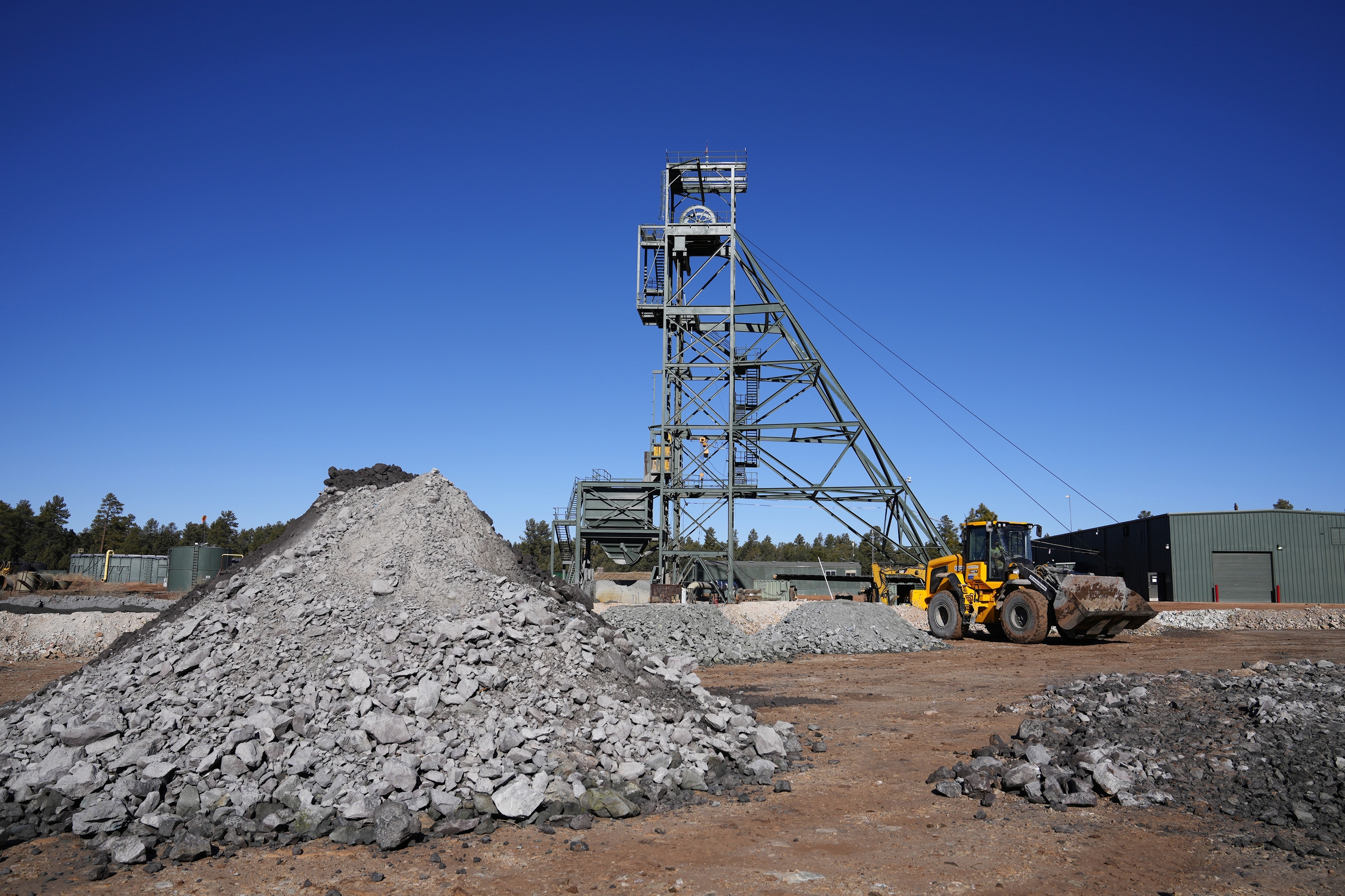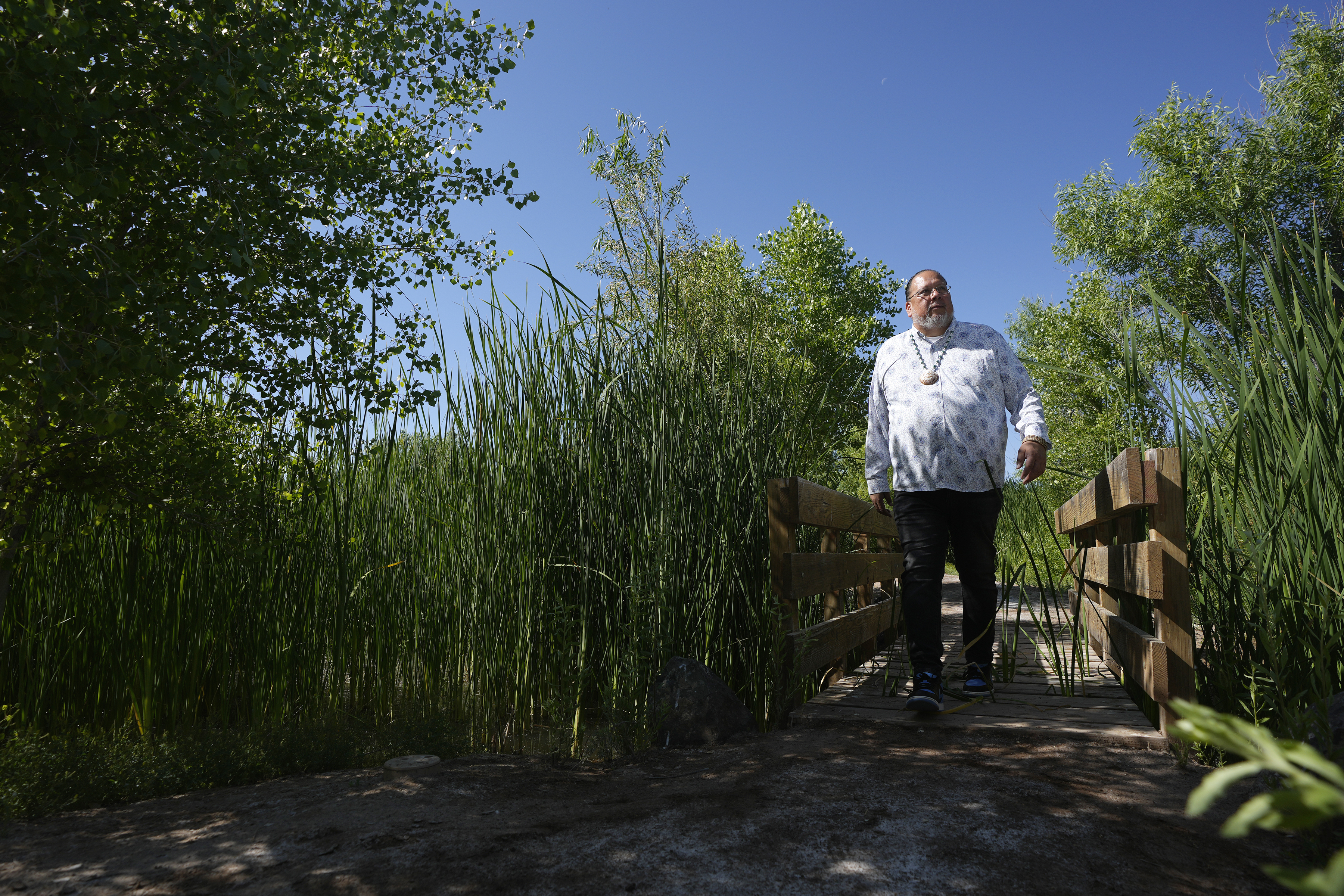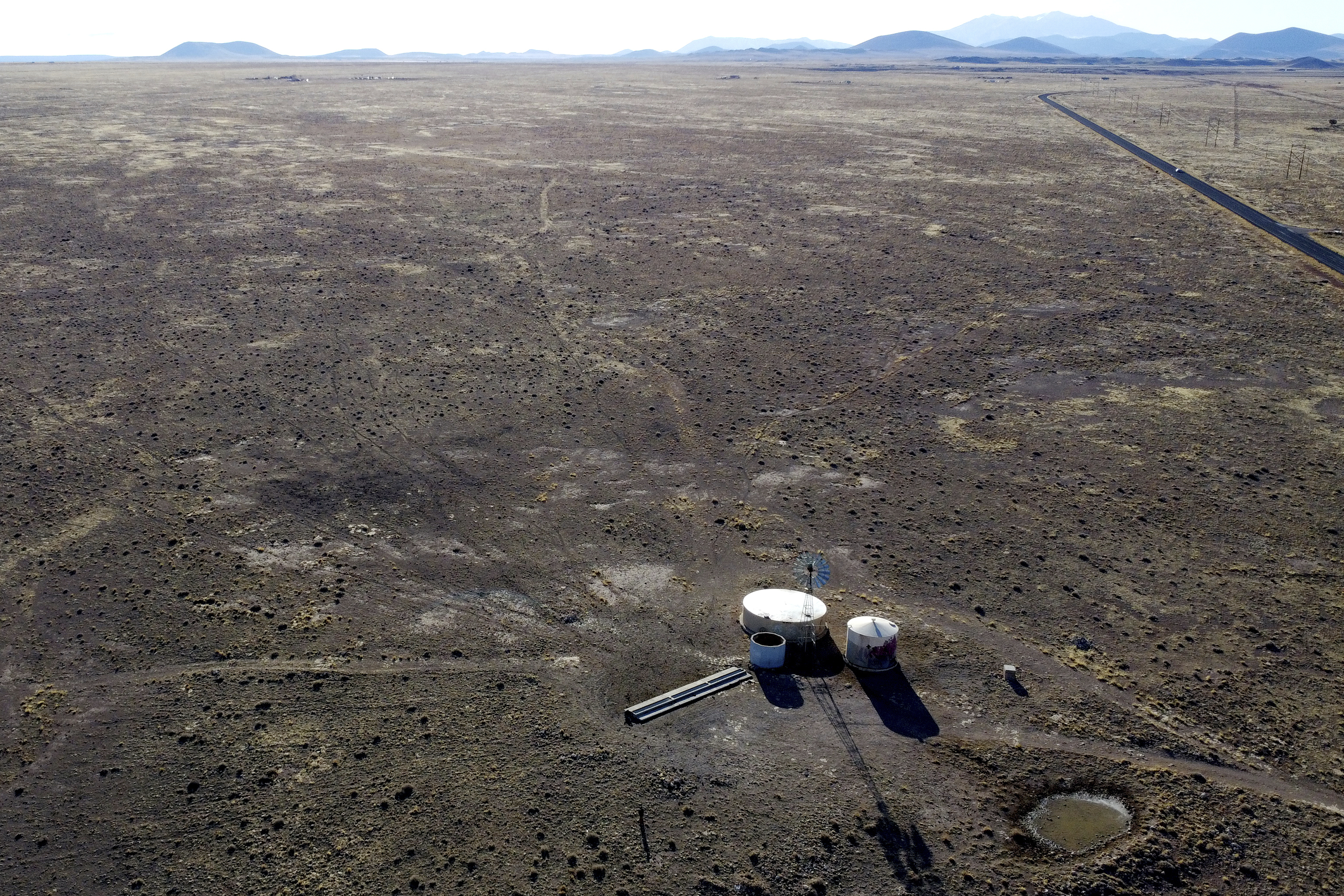Navajo Nation President Buu Nygren addresses a crowd at an indoor sports arena, Tuesday, Jan. 10, 2023, in Fort Defiance, Ariz. Navajo President Buu Nygren vowed to carry out a plan to enact roadblocks to prevent the transportation of uranium ore through the reservation while the tribe develops regulations to cover what are the first major shipments of uranium through its land in years.
AP Photo/Felicia Fonseca, File

FILE - , ore pile is the first to be mined at the Energy Fuels Inc. uranium Pinyon Plain Mine Wednesday, Jan. 31, 2024, near Tusayan, Ariz. Navajo President Buu Nygren vowed to carry out a plan to enact roadblocks to prevent the transportation of uranium ore through the reservation while the tribe develops regulations to cover what are the first major shipments of uranium through its land in years.
FILE - , ore pile is the first to be mined at the Energy Fuels Inc. uranium Pinyon Plain Mine Wednesday, Jan. 31, 2024, near Tusayan, Ariz. Navajo President Buu Nygren vowed to carry out a plan to enact roadblocks to prevent the transportation of uranium ore through the reservation while the tribe develops regulations to cover what are the first major shipments of uranium through its land in years.
(AP Photo/Ross D. Franklin, File)

The front entrance at the Energy Fuels Inc. uranium Pinyon Plain Mine is shown on Wednesday, Jan. 31, 2024, near Tusayan, Ariz. Navajo President Buu Nygren vowed to carry out a plan to enact roadblocks to prevent the transportation of uranium ore through the reservation while the tribe develops regulations to cover what are the first major shipments of uranium through its land in years. (AP Photo/Ross D. Franklin, File)
The front entrance at the Energy Fuels Inc. uranium Pinyon Plain Mine is shown on Wednesday, Jan. 31, 2024, near Tusayan, Ariz. Navajo President Buu Nygren vowed to carry out a plan to enact roadblocks to prevent the transportation of uranium ore through the reservation while the tribe develops regulations to cover what are the first major shipments of uranium through its land in years. (AP Photo/Ross D. Franklin, File)
August 2, 2024
PHOENIX (AP) — A uranium producer has agreed to temporarily pause the transport of the mineral through the Navajo Nation after the tribe raised concerns about the possible effects that it could have on the reservation.
Gov. Katie Hobbs said Friday that she intervened this week after talking with Navajo President Buu Nygren, who had come up with a plan to test a tribal law that bans uranium from being transported on its land.
Energy Fuels began hauling the ore Tuesday from its mine south of Grand Canyon National Park to a processing site in Blanding, Utah. When Nygren found out, he ordered tribal police to pull over the trucks and prevent them from traveling further. But by the time police arrived, the semi-trucks had left the reservation.
Energy Fuels said in a statement Friday that it agreed to a temporary pause “to address any reasonable concerns” held by Nygren. It recently started mining at the Pinyon Plain Mine in northern Arizona for the first time since the 1980s, driven by higher uranium prices and global instability. No other sites are actively mining uranium in Arizona.
“While Energy Fuels can legally restart transport at any time, pursuant to the current licenses, permits, and federal law, the company understands and respects President Nygren’s concern for his People, and wants to assure them that the company fully complies with all applicable laws and regulations,” the company said. “The U.S. has adopted the highest international standards for the transport of such materials, which are in place to protect human health and the environment.”
RELATED STORIES

Navajo Nation plans to test limit of tribal law preventing transportation of uranium on its land

Water-rich Gila River tribe near Phoenix flexes its political muscles in a drying West

Arizona congressional delegation introduces $5 billion tribal water rights legislation
Energy Fuels isn’t legally required to give advance notice. But the Navajo Nation, the U.S. Forest Service, county officials and others says the company verbally agreed to do so — and then reneged on the promise Tuesday.
The Navajo Nation said it wanted to ensure it had time to coordinate emergency preparedness plans and other notifications before hauling began. Energy Fuels said it notified federal, state county and tribal officials about two weeks ago that hauling was imminent and outlined legal requirements, safety and emergency response.
The tribe said it didn’t expect hauling to begin for at least another month, based on months of conversations with Energy Fuels.
Hobbs said the pause on transporting the ore will allow the company and the tribe “to engage in good faith negotiations.”
Arizona Attorney General Kris Mayes also said her office is looking into legal options “to protect the health and safety of all Arizonans.”
The tribe passed a law in 2012 to ban the transportation of uranium on the reservation that extends into Arizona, New Mexico and Utah. But the law exempts state and federal highways that Energy Fuels has designated as hauling routes.
Mining during World War II and the Cold War left a legacy of death, disease and contamination on the Navajo Nation and in other communities across the country. The Havasupai tribe is among the tribes and environmentalists that have raised concerns about potential water contamination.
PHOENIX (AP) — A uranium producer has agreed to temporarily pause the transport of the mineral through the Navajo Nation after the tribe raised concerns about the possible effects that it could have on the reservation.
Gov. Katie Hobbs said Friday that she intervened this week after talking with Navajo President Buu Nygren, who had come up with a plan to test a tribal law that bans uranium from being transported on its land.
Energy Fuels began hauling the ore Tuesday from its mine south of Grand Canyon National Park to a processing site in Blanding, Utah. When Nygren found out, he ordered tribal police to pull over the trucks and prevent them from traveling further. But by the time police arrived, the semi-trucks had left the reservation.
Energy Fuels said in a statement Friday that it agreed to a temporary pause “to address any reasonable concerns” held by Nygren. It recently started mining at the Pinyon Plain Mine in northern Arizona for the first time since the 1980s, driven by higher uranium prices and global instability. No other sites are actively mining uranium in Arizona.
“While Energy Fuels can legally restart transport at any time, pursuant to the current licenses, permits, and federal law, the company understands and respects President Nygren’s concern for his People, and wants to assure them that the company fully complies with all applicable laws and regulations,” the company said. “The U.S. has adopted the highest international standards for the transport of such materials, which are in place to protect human health and the environment.”
RELATED STORIES

Navajo Nation plans to test limit of tribal law preventing transportation of uranium on its land

Water-rich Gila River tribe near Phoenix flexes its political muscles in a drying West

Arizona congressional delegation introduces $5 billion tribal water rights legislation
Energy Fuels isn’t legally required to give advance notice. But the Navajo Nation, the U.S. Forest Service, county officials and others says the company verbally agreed to do so — and then reneged on the promise Tuesday.
The Navajo Nation said it wanted to ensure it had time to coordinate emergency preparedness plans and other notifications before hauling began. Energy Fuels said it notified federal, state county and tribal officials about two weeks ago that hauling was imminent and outlined legal requirements, safety and emergency response.
The tribe said it didn’t expect hauling to begin for at least another month, based on months of conversations with Energy Fuels.
Hobbs said the pause on transporting the ore will allow the company and the tribe “to engage in good faith negotiations.”
Arizona Attorney General Kris Mayes also said her office is looking into legal options “to protect the health and safety of all Arizonans.”
The tribe passed a law in 2012 to ban the transportation of uranium on the reservation that extends into Arizona, New Mexico and Utah. But the law exempts state and federal highways that Energy Fuels has designated as hauling routes.
Mining during World War II and the Cold War left a legacy of death, disease and contamination on the Navajo Nation and in other communities across the country. The Havasupai tribe is among the tribes and environmentalists that have raised concerns about potential water contamination.
No comments:
Post a Comment